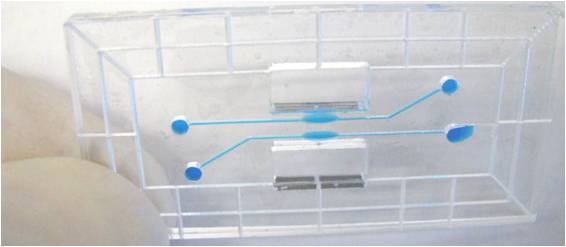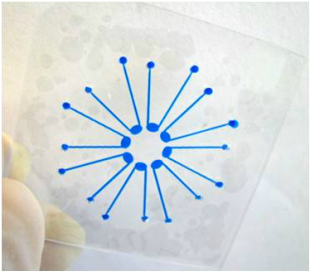Infrared PCR
Despite the current fad that the `genome era' is coming to an end (as the 'post-genome era' gets underway), genetic analysis will undoubtedly continue to be a prolific field of exploration. Genetic analytical methods will be critical in fleshing out new mutations correlative of neoplastic growth, understanding the significance of single nucleotide polymorphisms, and developing better genotyping methods for, e.g., microsatellite DNA. Accordingly, the purification of nucleic acid material from crude biological samples and the successful amplification of target DNA sequences by the polymerase chain reaction (PCR) will remain a requisite protocol that is of vital importance. We have demonstrated the feasibility of executing PCR in microchips using IR-mediated heating (i.e., using a heat lamp) and have shown that this can be directly interfaced with separation on the saure microchip. We now propose to further these developments 15y defining the appropriate microchip design and corresponding instrumentation for multiplexed PCR (36 samples at a time) and DNA separation on a single microchip. The PCR amplification will be completely non-contact (IR for heating and interferometry for temperature sensing) and capable of completing DNA amplification (up to 25 cycles) in 15 minutes or less. Multi-channel electrophoretic analysis of the PCR products will ensue on the same microchip with a sample throughput of more than a sample per minute (32 samples in less than 30 minutes). The seamless integration of multiplexed PCR with separation on a microdevice will provide a giant step towards automated instrumentation with 'sample-in-answer-out' capabilities for diagnostics and a variety of other fields. Such an approach will not only exploit the power of microchip technology for reducing sample volumes and increasing the speed of the PCR process, but set the stage for truly integrated genetic analysis on a microchip (a.k.a., a true lab-on-a-chip).
Poly(methyl mehtacrylate) Devices
Microdevices fabricated in polymers, such as poly(methyl methacrylate) (PMMA [acrylic]), are an inexpensive alternative to glass microdevices and can be easily fabricated using techniques such as CO2 laser ablation and milling. PMMA microchips are single-use, greatly reducing the risk of cross-contamination between samples. In addition, there is an ever-increasing national backlog of casework samples awaiting DNA processing. The use of microfluidic devices for one or more of the techniques associated with DNA analysis increases analysis time and has the potential to help reduce the number of cases in the backlog.
We focus on the development of expedited forensic DNA analysis methods through the design, fabrication and application of PMMA microdevices for DNA preparation and amplification. The first part of this work is the development of a PMMA multi-chamber PCR microdevice, which can simultaneously amplify up to 7 individual samples, including positive and negative controls, in under 40 minutes. This device represents a 3 and 25-fold reduction in analysis time and sample volume, respectively, as compared to conventional techniques. The second part of this work is the development of a PMMA microdevice which integrates enzyme-based DNA preparation and STR amplification on a single microchip. Once optimized, this microdevice will be capable of processing a fragment of a buccal swab using enzyme-based DNA preparation and STR amplification in under 1 hour, representing a 3-fold decrease in analysis time as compared to conventional methods.
We focus on the development of expedited forensic DNA analysis methods through the design, fabrication and application of PMMA microdevices for DNA preparation and amplification. The first part of this work is the development of a PMMA multi-chamber PCR microdevice, which can simultaneously amplify up to 7 individual samples, including positive and negative controls, in under 40 minutes. This device represents a 3 and 25-fold reduction in analysis time and sample volume, respectively, as compared to conventional techniques. The second part of this work is the development of a PMMA microdevice which integrates enzyme-based DNA preparation and STR amplification on a single microchip. Once optimized, this microdevice will be capable of processing a fragment of a buccal swab using enzyme-based DNA preparation and STR amplification in under 1 hour, representing a 3-fold decrease in analysis time as compared to conventional methods.
|
Contact Landers Research Group
jpl5e@virginia.edu (434) 243-8658 375, 379, 395 Chemistry Building McCormick Road Charlottesville, Va 22904 |




